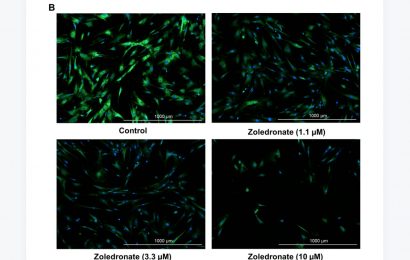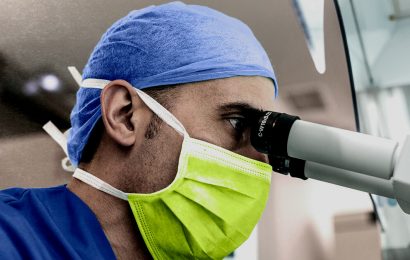
For years, I was an unwell young woman. Chronic pain got in the way of my social life and made working full time an endurance test.
Then I had Amelia.
I had been told by my gynaecologist that pregnancy would actually help my endometriosis pain, but if anything – the reality was that it became much worse.
After I had my child, I developed terrible hip pain, for example. It was so bad that when I tried to take my daughter to mum and baby classes, I couldn’t sit on the floor comfortably.
I just remember crying through during the session and feeling humiliated for not being unable to do such a simple thing.
Now, I am a mother to a four-year-old, in chronic pain, and worrying about the psychological impact it’ll have on my child.
I have severe endometriosis, where cells similar to those in the lining of the womb grow elsewhere. As a result, I had six operations between 2012-2019, and my diseased left ovary was removed.
Fate dealt me a devilish hand in 2016 when I tore the cartilage in my left hip during pregnancy. The joint was repaired in two surgeries, but the muscles, tendons and other structures around my hip remain were inflamed, limiting my mobility as well as my ability to sit, stand, walk, sleep – and pretty much everything else.
I would never wish my pain on anyone, but the thought of Amelia, or Millie as we call her, going down the same road truly terrifies me – and that isn’t an impossibility. Some studies indicate that children of parents in chronic pain are more likely to suffer adverse life outcomes and pain themselves in the longer term.
There is much evolving science that puts chronic pain down to a three-pronged ‘biopsychosocial’ model, meaning that everything from the physical issue itself to the stress you suffer in childhood and adulthood can potentially contributing factors for pain becoming chronic. In fact, anywhere from one third up to half of the UK population is thought to be in chronic pain.
Despite the prevalence of the condition in society, I worry daily about Millie seeing me take fistfuls of pills, immobilised on the sofa with a heat-pad, constantly unable to do things – the worry etched on her beautiful little face. No matter how much I try to hide my pain, living in the same house means it is inevitable she will witness it.
I feel immensely guilty that Millie misses out on important bonding moments: walks in the woods, me pushing her on the swings, swimming together, early mornings or cuddling a new sibling. I am an only child and at 34, I still long for a brother or sister. My husband Andy and I have six frozen embryos from the IVF cycle that helped us have Millie, but I don’t know if I’ll ever feel well enough to carry another baby.

There is, however, a single, golden thread to my pain. Millie is growing into a little girl with a huge heart, and empathy for others beyond what is developmentally normal.
Key workers at her nursery shared recently that she took a new child under her wing, holding her hand, giving her hugs and being her new friend. Millie perceived the girl’s anxiety and helped her without prompting. I was told that her continuous support made a world of difference to the child. That makes me so proud.
It’s not a one-off. If I drop something, she’ll rush to pick it up so I don’t have to bend. She’ll kiss my hip out of the blue. When she plays with her dolls, she makes one of them ‘poorly’ or with a sore hip so she can look after them. At bed time, she brings them to me to look after. She never leaves them without handing over their care first.
Then, in the mornings, when she climbs into our bed, she asks first how my pain is today. She lays calmly in bed till I am physically able to get up. If I suggest an outing, she glows as she asks: ‘Does that mean your hip isn’t hurting anymore?’ I lie and say yes, knowing full well I’ll have to go to bed when we get home.
Millie is understanding and accepting, putting my physical limitations ahead of her own desires and needs. When I suggest doing things with her that I usually can’t, she bubbles with joy.
I am so lucky that her dad shoulders the brunt of the physical childcare: bedtimes, early mornings, midnight duvet fluffing requests, weekend outings, baths, trips to the park and soft play. He works a demanding job with long hours and I wish with all my heart I could step up, do all nursery runs, take Millie out to give him a break, or get up with her at 6am.
After all the years it took for me to conceive our longed-for daughter, I desperately want to do all these tasks. Instead, I watch from the side-lines and hope that one day I can be the active, healthy mum that Millie deserves.
Despite my anxieties for how my illness impacts my child, she is seemingly thriving and becoming a lovely little person. In this world of trolls, bullies, dangerous, ignorant and despicable people, I am grateful that my child at least, will not become one of them.
Still, I’m working hard to get physically stronger, paying hundreds for physiotherapy, acupuncture, ultrasound therapy, chiropractors and CBT to rehab my muscles and mind. Treatment puts me in bed for days but I persevere.
I don’t want my pain to be a cross Millie has to bear throughout her childhood and beyond. She yearns for the news that my pain is better for good and I really want to give her that – even more than I want it for myself.
MORE: Daily orgasms are the only thing that helps me live with chronic pain
MORE: Until TV starts showing chronic pain accurately, I fear people will think I’m faking it
MORE: I have brittle bones – don’t assume I’m not suffering just because I’m used to pain
Source: Read Full Article


